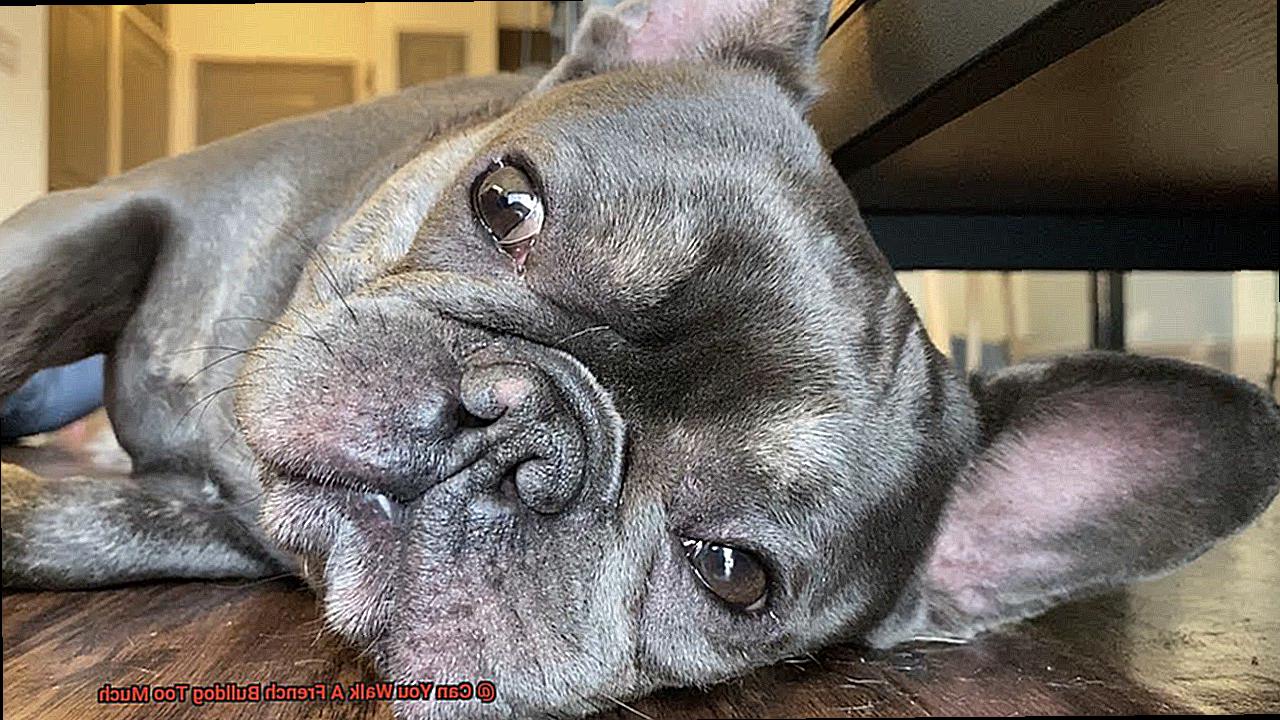Can You Walk A French Bulldog Too Much?
Picture this: you’re strolling down the street with your French Bulldog, his little paws padding along beside you. The sun is shining, and the world seems to be in perfect harmony. But suddenly, doubt creeps into your mind.
Can you walk a French Bulldog too much? As an owner of these adorable snort machines, it’s natural to want to give them all the love and exercise they need.
However, finding the right balance is crucial for their well-being. In this blog post, we’ll unravel the mystery behind excessive walking and its potential effects on our beloved Frenchies.
So, grab your leash and get ready to explore the fine line between enough and too much exercise for your furry companion.
Understanding the Physical Limitations of French Bulldogs
Contents
- 1 Understanding the Physical Limitations of French Bulldogs
- 2 How Much Exercise Should a French Bulldog Get?
- 3 Signs of Exhaustion in French Bulldogs
- 4 Factors to Consider When Walking a French Bulldog
- 5 Low-Impact Activities for French Bulldogs
- 6 Consulting with a Veterinarian for Personalized Advice
- 7 Mental Stimulation for Your French Bulldog
- 8 Finding the Right Balance Between Exercise and Rest
- 9 Conclusion

French Bulldogs are undoubtedly adorable with their unique appearance and playful personalities. However, it’s important to understand their physical limitations to ensure their well-being and prevent any potential health issues. In this article, we will explore the physical limitations of French Bulldogs and provide useful insights for their owners.
Brachycephalic Anatomy
One of the defining characteristics of French Bulldogs is their brachycephalic (short-nosed) anatomy. While it adds to their charm, it also presents certain challenges. Their shortened airways make them more prone to respiratory issues, especially during exercise or exertion. French Bulldogs can easily become short of breath, which can be distressing for them.
Heat Intolerance
Another significant limitation is their propensity for overheating. French Bulldogs have difficulty regulating their body temperature, making them more susceptible to heat stroke and other heat-related illnesses. Overexertion exacerbates this issue, as it increases their body temperature even further. It’s crucial to provide them with a cool and comfortable environment, especially during hot weather.
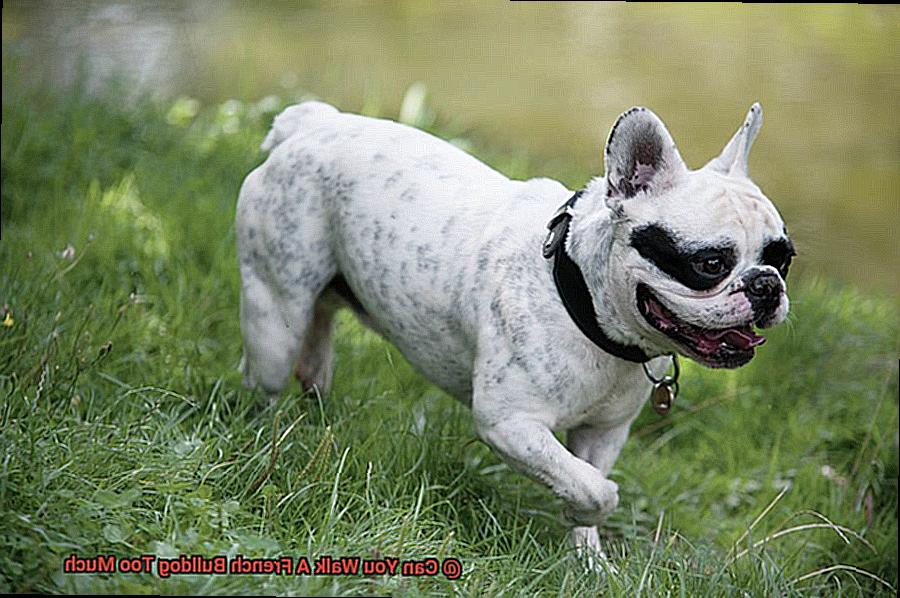
Joint Problems
French Bulldogs are also prone to joint problems like hip dysplasia and patellar luxation. These conditions can cause pain and mobility issues, making strenuous exercise potentially harmful for them. Excessive walking or running can strain their joints, worsening these conditions.
Endurance Limitations
It’s important to recognize that French Bulldogs are not built for endurance or long-distance activities. Their bodies are designed for short bursts of energy rather than sustained exercise. While they do enjoy walks and playtime, it’s crucial not to push them beyond their capabilities.
Age Considerations
The age of your French Bulldog is another factor to consider when determining the suitable amount of exercise. Puppies have developing bones and joints that are more vulnerable to damage, so shorter and less intense exercise sessions are recommended. Older French Bulldogs may have age-related mobility issues and may require gentler activities.
Finding the Right Balance
To keep your French Bulldog happy and healthy, it’s crucial to strike the right balance between keeping them active and preventing overexertion. Regular walks and play sessions are essential for their mental and physical well-being. However, it’s important to monitor their breathing, body temperature, and overall comfort level during these activities.
Consulting with a Veterinarian
To ensure you are meeting your French Bulldog’s individual needs and limitations, consulting with a veterinarian is highly recommended. They can provide personalized guidance on the appropriate amount and intensity of exercise that will keep your furry friend happy and healthy without putting them at risk.
How Much Exercise Should a French Bulldog Get?
Well, you’ve come to the right place. As an expert in all things French Bulldog, I’m here to provide you with some pawsome tips on exercising your adorable Frenchie. So, let’s dive right into it, shall we?
Understanding their Unique Needs:
French Bulldogs are a small breed with a moderate energy level. Their short-nosed (brachycephalic) structure makes them prone to overheating, so it’s essential to consider their physical limitations when planning their exercise routine.
Exercise Guidelines:
- Age Matters: Just like us humans, French Bulldog puppies have bundles of energy. They may require shorter bursts of exercise throughout the day. Aim for 5-10 minutes of playtime per month of age, gradually increasing as they grow older.
- The Golden Rule: A general guideline for adult French Bulldogs is around 20-30 minutes of exercise per day. This can be divided into two or three shorter walks or play sessions. Remember, quality over quantity.
- Mix It Up: Variety is the spice of life for our furry friends too. Incorporating mental stimulation activities such as short training sessions, puzzle toys, and interactive games will keep their minds sharp and boredom at bay.
- Tailor-made Exercise: Every Frenchie is unique, just like their humans. Some may have health conditions or be older, requiring less strenuous exercise or shorter durations. Consulting with a veterinarian will help you create a personalized exercise plan that suits your Frenchie’s specific needs.
- Listen to Your Frenchie: Our adorable companions have a way of communicating with us, even without words. Keep an eye out for signs of fatigue or discomfort during exercise. If they’re panting excessively, slowing down, or showing signs of distress, it’s time for a break.
- Play it Safe: Overexercising can lead to exhaustion, overheating, and potential injuries. French Bulldogs are not built for endurance activities, so avoid long hikes or intense agility training. Stick to low-impact exercises like short walks, gentle play sessions, and swimming (if they enjoy it.).
Signs of Exhaustion in French Bulldogs
As a French Bulldog owner, it’s crucial to be aware of the signs of exhaustion in your furry friend. Due to their brachycephalic (short-nosed) structure, French Bulldogs are more prone to overheating and becoming exhausted quickly. Here are some signs to watch out for:
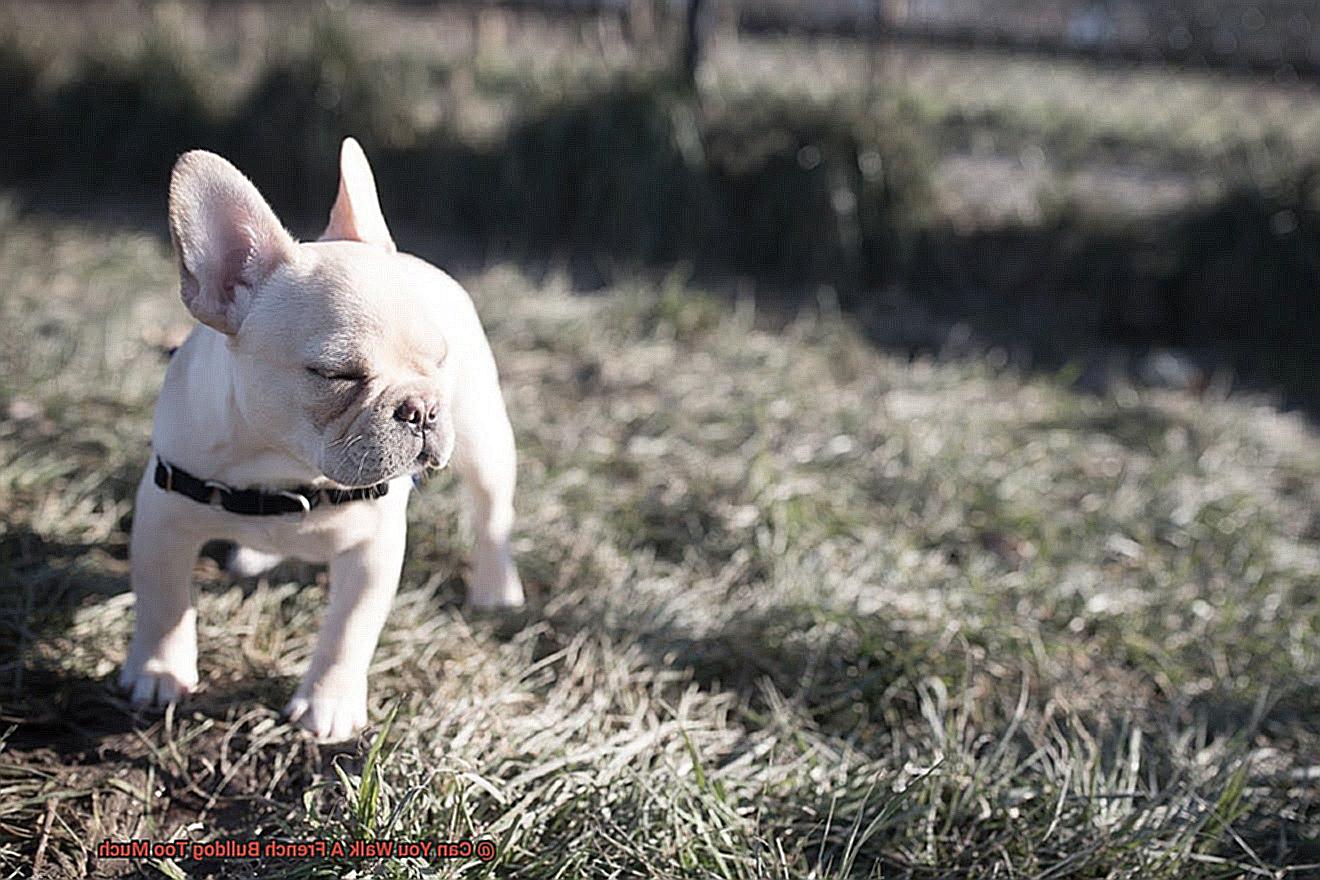
- Heavy Panting: Excessive panting, with their tongue hanging out and breathing heavily, is a clear sign that your Frenchie is getting tired and needs a break. Panting helps regulate their body temperature, but if it becomes excessive, it’s time to rest.
- Excessive Drooling: When a French Bulldog becomes exhausted, they may start drooling more than usual. This is their body’s way of trying to cool itself down. If you notice excessive drooling, it’s a sign that your Frenchie needs a break and some water.
- Slowing Down or Lagging Behind: If your dog starts to walk at a slower pace, seems uninterested in continuing, or constantly stops and lies down during walks, it’s likely that they have reached their limit and need rest.
- Muscle Tremors or Weakness: Extreme fatigue can manifest as muscle tremors or weakness in French Bulldogs. If your dog’s legs start shaking or they have difficulty standing or walking, stop the walk immediately and provide them with water and a comfortable place to rest.
Remember, overheating is a real danger for French Bulldogs. Keep an eye out for signs like excessive panting, bright red gums or tongue, vomiting, collapse, or seizures. If your Frenchie shows any signs of overheating, seek immediate veterinary attention.
Preventing Exhaustion in French Bulldogs
To prevent exhaustion in your French Bulldog, there are several measures you can take:
- Choose Optimal Walking Times: Avoid walking your Frenchie during the hottest parts of the day. Instead, opt for cooler times like early morning or late evening. Keep an eye on the temperature and humidity levels to ensure a comfortable walk.
- Take Regular Breaks: During walks, it’s essential to take short breaks every 10-15 minutes. This allows your Frenchie to rest, drink water, and cool down. These breaks help them recover their energy and prevent overheating.
- Adjust Exercise Routine: Every French Bulldog is unique, and their tolerance for exercise may vary. Pay attention to your dog’s individual needs and adjust their exercise routine accordingly. Some may be able to handle longer walks, while others may tire more quickly.
- Provide a Balanced Diet and Plenty of Water: A balanced diet rich in nutrients will contribute to your Frenchie’s overall well-being and stamina. Additionally, always ensure they have access to fresh water during walks and throughout the day.
Factors to Consider When Walking a French Bulldog
French Bulldogs are delightful and lovable companions, but they require special care when it comes to exercise. Being a brachycephalic breed with a short muzzle, they can have difficulty breathing. To ensure the safety and well-being of your furry friend, here are some important factors to consider when walking a French Bulldog.
- Age and Health: Just like humans, dogs have different levels of stamina depending on their age and health. Puppies and senior dogs may not have the same energy levels as adult dogs, so it’s important to adjust the length and intensity of their walks accordingly. Shorter, more frequent walks may be better for them.
- Weight Management: French Bulldogs have a stocky build and are prone to weight gain. Regular walks help them maintain a healthy weight, preventing obesity-related health issues. Keep an eye on their calorie intake and adjust their exercise routine as needed.
- Weather Conditions: French Bulldogs are sensitive to extreme temperatures, especially heat. Avoid walking them during the hottest parts of the day and opt for early morning or late evening walks when it’s cooler outside. Be mindful of signs of overheating such as excessive panting or lethargy.
- Gradual Increase in Exercise: Start with shorter walks and gradually increase the duration and distance over time. This helps build their stamina and prevents fatigue or injury. Listen to your dog’s cues and adjust the pace accordingly.
- Respiratory Issues: Being brachycephalic, French Bulldogs are prone to respiratory problems. Watch for signs of breathing difficulties during walks, such as excessive panting or wheezing. If these symptoms occur, it’s essential to provide breaks and shorten the walk if necessary.
- Walking Surface: French Bulldogs have short legs, which can make walking on uneven or slippery surfaces challenging. Choose paths that are suitable for their physical abilities to prevent accidents or injuries.
- Individual Needs and Preferences: Every dog is unique, so it’s important to consider your French Bulldog’s individual needs and energy levels. Some may require longer walks to burn off excess energy, while others may prefer shorter, more leisurely strolls. Pay attention to their behavior and adjust their exercise routine accordingly.
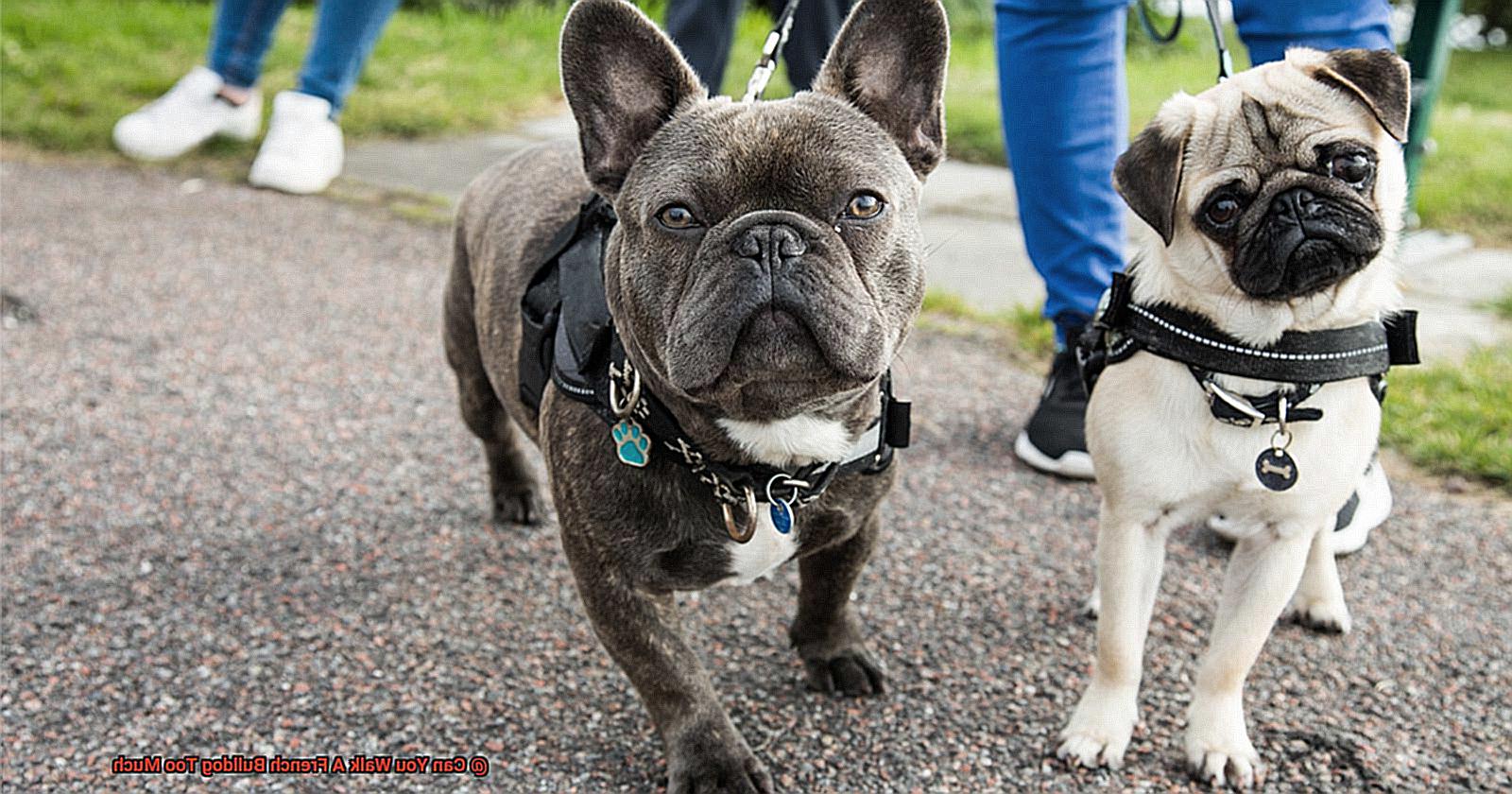
Low-Impact Activities for French Bulldogs
French Bulldogs are known for their adorable looks and friendly personalities. However, due to their compact and muscular build, it is important to incorporate low-impact activities into their exercise routine to avoid joint strain and maintain their overall health. In this blog post, we will explore some fun and safe low-impact activities that your French Bulldog can enjoy.
Swimming:
Swimming is an excellent low-impact activity for French Bulldogs. It provides a full-body workout while being gentle on their joints. Whether it’s in a pool, lake, or the ocean, swimming allows your furry friend to burn off energy while staying cool. Just make sure to supervise them closely and use a life jacket if needed.
Soft Surface Walks:
Walking on soft surfaces like grass or sand can reduce the impact on your French Bulldog’s paws and joints. It provides both physical exercise and mental stimulation as they explore new environments and encounter different smells. Aim for shorter walks multiple times a day to avoid overexertion.
Fetch with Soft Toys:
Playing fetch is a classic activity that French Bulldogs love. Use soft toys or frisbees that are appropriate for their size to avoid any potential injuries. This activity allows them to engage in physical exercise while also providing mental stimulation as they chase after the toy.
Puzzle Toys and Interactive Games:
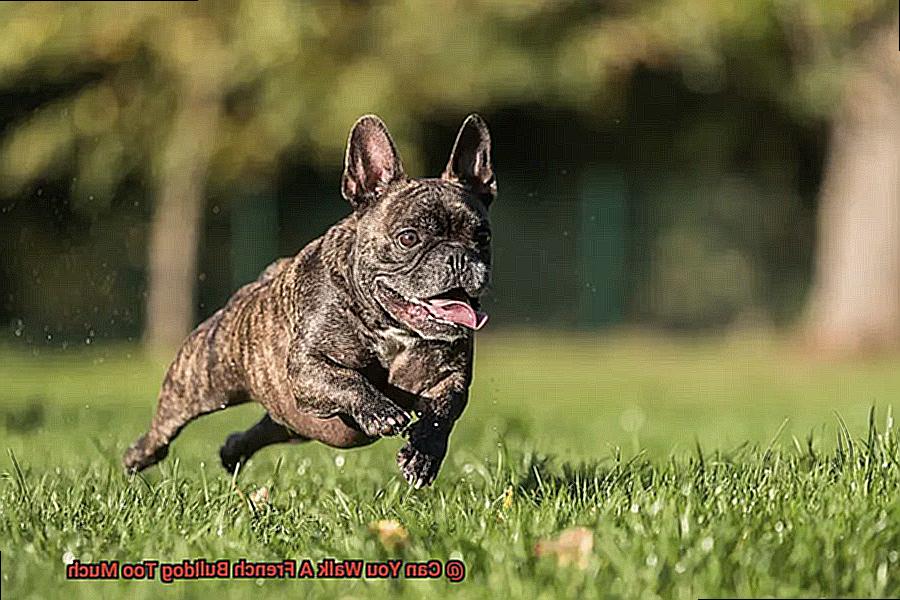
Puzzle toys and interactive games are perfect for mental stimulation without putting strain on your French Bulldog’s body. These toys require problem-solving skills to obtain treats or rewards, keeping them entertained and engaged. Look for toys that are specifically designed for small breeds.
Gentle Stretching Exercises:
Gentle stretching exercises can help improve your French Bulldog’s flexibility, range of motion, muscle strength, and joint health. Simple stretches like extending their legs or rotating their hips can be performed with caution under the guidance of a veterinarian or professional trainer.
Consulting with a Veterinarian for Personalized Advice
French Bulldogs are known for their adorable appearance and friendly nature. However, as a responsible owner, it’s crucial to understand their unique exercise needs. While it’s tempting to rely on general knowledge, consulting with a veterinarian is paramount to ensure your French Bulldog gets the right amount and type of exercise. In this blog post, we’ll explore the reasons why personalized advice from a veterinarian is essential and offer expert insights to help you keep your furry friend active and thriving.
Individual Health Considerations:
French Bulldogs, like any other breed, have individual health considerations that require personalized attention. A veterinarian can assess your dog’s overall health condition, weight, age, and any underlying medical issues to determine the appropriate exercise routine. This tailored approach ensures that your French Bulldog’s exercise plan takes into account their unique circumstances.
Breed-Specific Needs:
French Bulldogs have specific breed characteristics that must be considered when planning their exercise regimen. Their brachycephalic (short-nosed) structure makes them more prone to respiratory issues. A veterinarian can guide you on exercises that promote cardiovascular health while minimizing the risk of breathing difficulties. They can also advise on activities that suit the breed’s energy level and size.
Fitness Assessment:
A veterinarian possesses the expertise to assess your French Bulldog’s fitness level accurately. They evaluate cardiovascular health, muscle strength, and joint flexibility to determine the intensity and duration of exercise sessions. This evaluation ensures that your French Bulldog engages in activities that challenge them without causing undue strain or harm.
Preventing Injuries:
Consulting with a veterinarian helps prevent exercise-related injuries for your French Bulldog. They can identify any pre-existing joint problems or weight issues that may impact their ability to engage in certain activities safely. With personalized advice, you can design an exercise routine that minimizes the risk of injury and promotes overall well-being.
Weight Management:
Obesity is a prevalent health issue among French Bulldogs. Excess weight puts strain on their joints and increases the risk of other health problems. A veterinarian can recommend exercises that promote weight management while considering your French Bulldog’s specific nutritional needs. This personalized approach aids in maintaining a healthy weight, reducing the risk of obesity-related complications.

Conclusion:
Consulting with a veterinarian for personalized advice regarding the exercise needs of your French Bulldog is crucial for their overall health and well-being. By taking into account individual health considerations, breed-specific needs, and fitness assessments, a veterinarian can guide you in designing a tailored exercise plan that prevents injuries, manages weight, and promotes optimal cardiovascular health. Remember, every French Bulldog is unique, so personalized advice from a veterinarian ensures that your furry friend stays happy, healthy, and active for years to come.
Mental Stimulation for Your French Bulldog
French Bulldogs may be small in size, but they have big personalities and even bigger brains. Providing mental stimulation for your Frenchie is just as important as physical exercise to keep them happy, healthy, and engaged. So how can you give your furry friend the mental workout they need? Let’s dive into some pawsome tips and tricks.
- Interactive Toys and Puzzles: Treat-dispensing toys, puzzle balls, and interactive feeding bowls are a fantastic way to challenge your Frenchie’s problem-solving skills. These toys keep them entertained for hours as they work their way towards tasty rewards. Get ready to witness their tail wag with delight as they conquer each puzzle.
- Obedience Training: Teaching your French Bulldog new commands and tricks not only keeps their minds active but also strengthens the bond between you and your pet. Consider enrolling them in a training class or working with a professional trainer to ensure effective results. Who knows, they might even learn to fetch you a cold drink from the fridge.
- Scent Work Activities: French Bulldogs have an incredible sense of smell, so why not put it to good use? Hide treats or toys around the house or set up a mini-obstacle course where they can use their sniffer to navigate. It’s like a game of hide-and-seek that will have their tails wagging in excitement.
- Socialization: Exposing your Frenchie to different environments, people, and other animals is crucial for their mental wellbeing. Regular outings to dog parks, playdates with well-behaved buddies, or joining organized dog events can help them develop confidence, adaptability, and social skills. Plus, it’s a great way to make new furry friends.
- Quality Time Together: Your French Bulldog thrives on human interaction, so don’t forget to spend quality time with them. Whether it’s playing fetch, going for leisurely walks, or simply cuddling on the couch, these activities provide mental stimulation through companionship and bonding. After all, there’s nothing better than a Frenchie snuggle session.
Finding the Right Balance Between Exercise and Rest
French Bulldogs are adorable little bundles of energy. Their compact size and muscular build may give the impression that they don’t require much exercise, but that couldn’t be further from the truth. Regular exercise is essential for the health and happiness of these lovable pups. However, finding the right balance between exercise and rest is equally important to ensure their well-being. Let’s dive into why this balance is crucial and how you can achieve it.
Why Exercise Matters
Exercise plays a vital role in maintaining your French Bulldog’s weight and muscle tone. It helps prevent obesity, which can lead to a host of health problems. Additionally, exercise keeps their minds stimulated, preventing boredom and destructive behavior. But remember, moderation is key.
Respiratory Challenges
French Bulldogs have short snouts, a characteristic known as brachycephalic. This unique feature makes them prone to respiratory problems. Excessive exercise can strain their respiratory system, leading to breathing difficulties. To avoid this, opt for short walks instead of long runs or strenuous activities. This allows them to get some exercise without overwhelming their respiratory system.
Heat Sensitivity
French Bulldogs have a low tolerance for heat and are susceptible to overheating. It’s essential to be mindful of this, particularly in hot weather or if they are not adequately hydrated. Too much exercise in these conditions can be dangerous and even life-threatening for your furry friend. Be sure to provide plenty of water and take breaks in shaded areas during walks or playtime.
Age and Physical Condition
Consider your French Bulldog’s age and physical condition when determining their exercise routine. Puppies have boundless energy and may benefit from shorter bursts of exercise multiple times throughout the day. Older dogs may require less intense exercise but still need regular movement to stay healthy.
Monitoring and Rest
While exercising your French Bulldog, keep a close eye on their behavior. Watch for signs of fatigue, excessive panting, or difficulty breathing. If you notice any of these signs, it’s crucial to stop the activity and give your dog a chance to rest and recover. Rest is just as important as exercise for French Bulldogs. They need time to relax and recharge, so provide them with a comfortable place to rest and ensure they have access to fresh water.
Finding the Right Balance
Finding the right balance between exercise and rest for your French Bulldog may require some trial and error. Every dog is unique, so pay attention to their individual needs and adjust their exercise routine accordingly. Consulting with a veterinarian is always a good idea when determining the appropriate amount of exercise for your French Bulldog. They can provide guidance based on your dog’s specific health needs and help you find the right balance.
iMpXeyX8VT4″ >
Conclusion
Walking is an essential part of a French Bulldog’s daily routine. It provides them with physical exercise, mental stimulation, and the opportunity to explore their surroundings. However, it is important to strike a balance and not overdo it.
While French Bulldogs enjoy walks, they are not built for endurance or long-distance activities.
Excessive walking can put strain on their short legs and compact bodies, leading to fatigue and potential joint problems. It is crucial to consider their breed characteristics and individual needs when determining the appropriate amount of exercise.
Short bursts of activity throughout the day are ideal for French Bulldogs. This can include multiple shorter walks or play sessions in the yard. By breaking up the exercise into manageable chunks, you prevent overexertion while still meeting their exercise requirements.
Additionally, it is vital to be mindful of weather conditions. French Bulldogs are sensitive to extreme temperatures, particularly heat. Walking them during cooler parts of the day or in shaded areas helps prevent overheating and discomfort.
Remember that each dog is unique, so it’s essential to observe your French Bulldog’s behavior during and after walks. If they seem excessively tired or show signs of discomfort, such as limping or panting heavily, it may be a sign that they have been walked too much.
In conclusion, while regular exercise is crucial for a French Bulldog’s well-being, there is such a thing as walking them too much.
